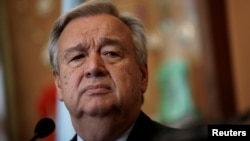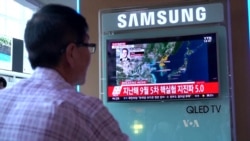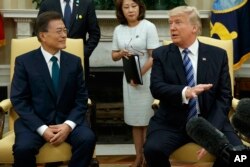North Korea's nuclear weapons program is the most serious threat the world currently faces, the U.N. secretary-general said Tuesday, warning that "confrontational rhetoric may lead to unintended consequences."
At U.N. headquarters, Antonio Guterres said that "the solution must be political. The potential consequences of military action are too horrific."
"Negotiations will depend on the will of the parties," the U.N. chief added. "My appeal is not for any specific solution."
WATCH: Are sanctions the answer?
North Korea on Tuesday, two days after its latest atomic test, declared itself a "full-fledged nuclear power in possession of ICBM as well as A-bomb and H-bomb."
U.S. President Donald Trump said Tuesday that he was allowing Japan and South Korea to buy more U.S. military equipment.
The president tweeted the remark a day after he spoke with South Korean President Moon Jae-in about North Korea's sixth nuclear explosion, which Pyongyang claimed was the detonation of a hydrogen bomb, at its Punggye-ri test site.
In that phone call, Trump and his counterpart in Seoul agreed to lift payload restrictions on South Korean missiles.
It is not immediately clear what equipment Trump was alluding to with his Tuesday morning tweet, but analysts said he was most likely referring to missiles and related systems.
"Japan has been seeking an extremely advanced missile radar which the U.S. had not previously given it," said Anthony Cordesman, the strategy chair at the Center for Strategic and International Studies.
"South Korea has been reluctant to buy American weapons when it has plans to develop its own. But buying new types of arms from the United States would be the fastest way to upgrade its defenses, particularly ballistic missile defenses," said Jonathan Pollack, a senior research associate at the James Martin Center for Nonproliferation Studies, a research group headquartered in Monterey, California.
Pollack told VOA that Seoul specifically might be interested in purchasing SM-3 and SM-6 missile interceptors.
Such moves could raise objections from Beijing.
"I think that China would like to see as little actual militarization of the Korean Peninsula and Japan as possible," Cordesman, a former director of intelligence assessment in the defense secretary's office, told VOA.
A day after the U.S. ambassador to the United Nations, Nikki Haley, told the Security Council that Pyongyang was "begging for war," a North Korean foreign ministry spokesman, quoted by state media on Tuesday, responded that "the U.S. is indeed the heinous aggressor who is begging for war."
The unnamed spokesman added that the United States was "terribly mistaken" in thinking it could frighten North Korea by talk of "all options" on the table and "imposing the toughest sanctions."
China, which is North Korea's only major ally, and Russia contend that further tightening sanctions against Pyongyang will do little to ease tensions on the Korean Peninsula.
Republican U.S. Senator Lindsey Graham of South Carolina, who is a member of the Senate Armed Services Committee, said on Twitter on Tuesday: "Can't believe I'm agreeing with Vladimir Putin but I am — further sanctions on North Korea very unlikely to work."
But Moon, the South Korean president, has asked the United Nations to consider blocking oil shipments to the North, government officials in Seoul told reporters.
White House officials have not mentioned oil sanctions against Pyongyang, but they said Trump and Moon broadly agreed on all major points in a 40-minute telephone conference Monday.
The United States this week is circulating a draft of a new resolution about North Korea at the United Nations, hoping for a Security Council vote next Monday.
Trump has vowed to stop all U.S. trade with any country doing business with North Korea, and Treasury Secretary Steven Mnuchin says he is working on details of such a plan, which would primarily target Pyongyang's neighbor and main trading partner, China. More than 90 percent of North Korea's export earnings come from China.
“I think it would be so disruptive that it wouldn’t produce any additional assistance from China, and it could be economically catastrophic to our economy and the world’s economy,” the top Democratic senator on the Armed Services Committee, Jack Reed, tells VOA. “I think a much more targeted approach and working as closely as we can with them [China] would make more sense."
VOA's Margaret Besheer at the United Nations and Michael Bowman on Capitol Hill contributed to this report.









